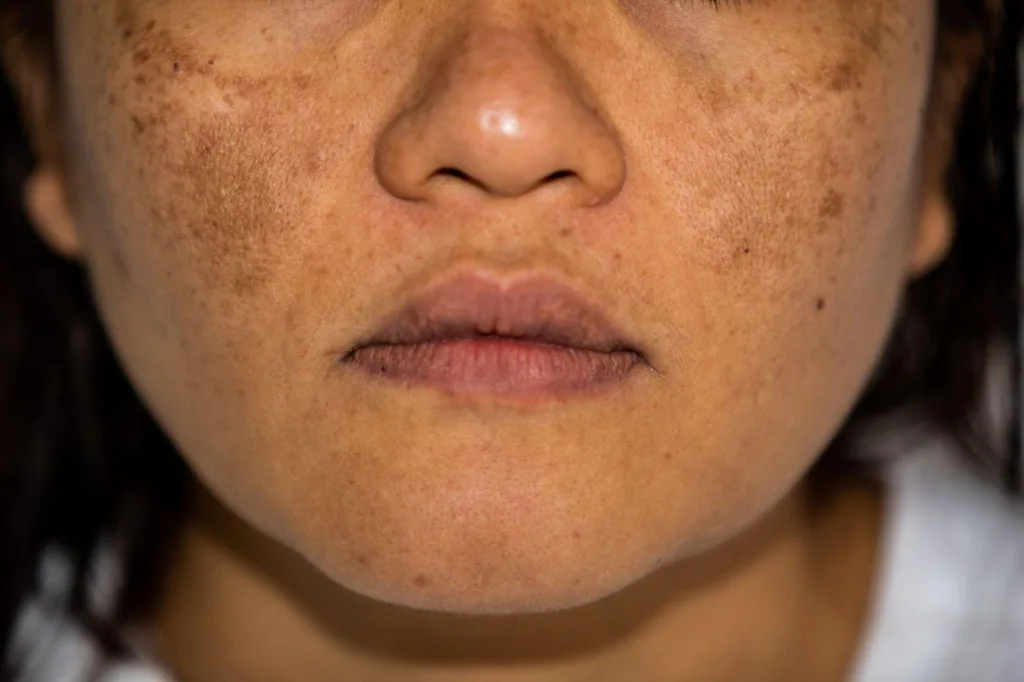Dr. Mara Padilla Evangelista-Huber, FPDS, FDSP, MClinRes
What gives color to our skin?
Melanin is the pigment molecule that gives our skin, hair and eyes color. It provides protection from ultraviolet radiation, which can cause premature skin aging (wrinkles, uneven skin) and skin cancer.
Melanin is made by cells in the skin called melanocytes, and one of the crucial steps involves an enzyme called tyrosinase. After melanin is made, it is transferred from melanocytes to the keratinocytes (skin cells).
What is hyperpigmentation?
Hyperpigmentation refers to excess pigmentation. This pertains to areas of skin that appear darker in color compared to other regions. It may develop anywhere in the body, may be small patches or be more widespread. While hyperpigmentation is not generally harmful, it can be a symptom of an underlying medical condition.
What causes hyperpigmentation?
There are many causes for hyperpigmentation. These triggers basically tell the melanocytes to make more melanin. One of the most common causative factors is sun exposure, which is why sun protection is very important.
Causes of hyperpigmentation:
- Ultraviolet radiation
- Visible and infrared light
- Medications (e.g. oral contraceptives)
- Inflammation (e.g. acne, eczema, bites)
- Trauma to the skin (e.g. wounds, burns)
- Hormones (e.g. pregnancy)
- Genetics (e.g. darker skin phototypes)
- Medical conditions (e.g. Addison’s disease)
Individuals with medium to darker-colored skin types are more prone to develop hyperpigmentation compared to those with lighter skin types because the former have more melanin to begin with.
What are the types of hyperpigmentation?
The most common types of hyperpigmentation are melasma, post-inflammatory hyperpigmentation, and sun spots or solar lentigines.
Melasma is one of the most common reasons for consultation with a dermatologist. The hyperpigmentation is usually on the face, specifically on the forehead, cheeks, nose, chin, but can occur elsewhere. Melasma mostly affects adult women and darker skin types. It can be caused by hormonal changes (e.g. pregnancy, use of oral contraceptives).
Post-inflammatory hyperpigmentation. This type of hyperpigmentation occurs after inflammation (common in acne and eczema patients) and injuries. You’ll see dark patches of skin on previously inflamed or reddish areas,
Sun spots or solar lentigines. This type of hyperpigmentation occurs in areas with high sun exposure like the face, forearms, hands. These are flat, round to oval dark patches, may be single or appear in a group.
How do we prevent and treat hyperpigmentation?
When dealing with hyperpigmentation, a two-way strategy is recommended: (1) to protect the skin and prevent hyperpigmentation from developing, and (2) to treat and correct existing hyperpigmentation.
Sunscreens, sun protection measures and topical anti-oxidants like vitamin C are very helpful in preventing hyperpigmentation. The cause of hyperpigmentation (e.g. acne, eczema, insect bites) must also be addressed.
When it comes to treating hyperpigmentation, a combination of these methods are beneficial: one is to inhibit tyrosinase (an important step in melanin synthesis), another is to inhibit the transfer of melanin from melanocytes to keratinocytes (skin cells), and lastly, to increase the renewal of skin so that new skin cells can replace the old, hyperpigmented skin cells.
Protect and prevent:
- Sunscreen
- Address underlying cause (e.g. acne, eczema, stop medication)
- Antioxidants (e.g vitamin C, vitamin E, coenzyme Q10, cysteamine)
Treat: inhibit melanin transfer
- Niacinamide
- Retinoids (e.g. Tretinoin, Adapalene, Retinol)
- Soy
Treat: tyrosinase inhibitor
- Hydroquinone
- Retinoids
- Kojic acid
- Azelaic acid
- Arbutin
- Vitamin C
- Licorice
- Cysteamine
Treat: increase cell renewal
- Retinoids
- Alpha hydroxy acids (e.g glycolic acid, lactic acid, mandelic acid) and Beta hydroxy acids (e.g. salicylic acid)
- Chemical peels, lasers, microdermabrasion
What is hydroquinone?
Hydroquinone is a prescription-only drug considered a standard in the treatment of hyperpigmentation. While effective when used correctly, it may cause irritation, burning, stinging, and dryness – with higher concentrations posing higher risks. It is not recommended to use hydroquinone continuously due to the risk of ochronosis (paradoxical hyperpigmentation). The use of hydroquinone is only advised under the guidance of a dermatologist.
How long will it take for hyperpigmentation to resolve?
It depends. Hyperpigmentation may go away even without treatment within 3 to 24 months, but treatment can speed up the process. Hyperpigmentation may fully resolve or lighten considerably, but for others it may not completely disappear.
Hyperpigmentation: a final word
- Hyperpigmentation is a multifactorial condition that may require multiple management options.
- Prevention is key! Sunscreens, sun protection measures and topical anti-oxidants are very helpful in this regard.
- It is best to consult a board-certified dermatologist to determine the cause of the pigmentation and arrive at the best skin regimen and adjunctive treatments, if needed.
- Fading will take time, with or without treatment.
- Be patient and stick to your prescribed regimen.
- Treatment response differs from patient to patient.
- Steroids, mercury and high levels of hydroquinone have been present in some unregulated “bleaching creams”.
- Be wary if active ingredients are not declared.
References:
Davis EC, Callender VD. Postinflammatory hyperpigmentation: a review of the epidemiology, clinical features, and treatment options in skin of color. J Clin Aesthet Dermatol. 2010;3(7):20-31.
Desai SR. Hyperpigmentation therapy: a review. J Clin Aesthet Dermatol. 2014;7(8):13-17.
Vashi NA, Wirya SA, Inyang M, Kundu RV. Am J Clin Dermatol. 2017 Apr; 18(2):215-230.
Huerth KA, Hassan S, Callender VD. Therapeutic Insights in Melasma and Hyperpigmentation Management. J Drugs Dermatol. 2019 Aug 1;18(8):718-729




